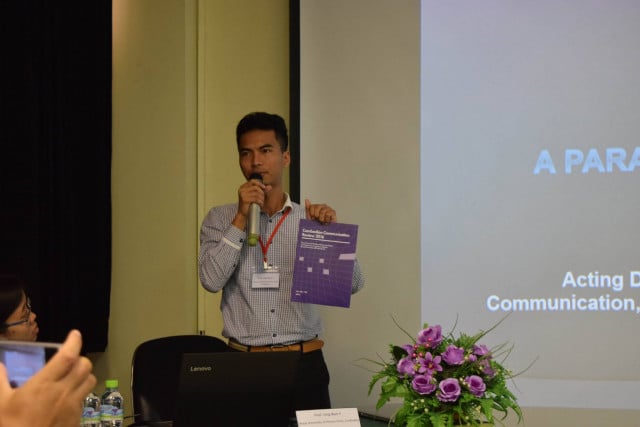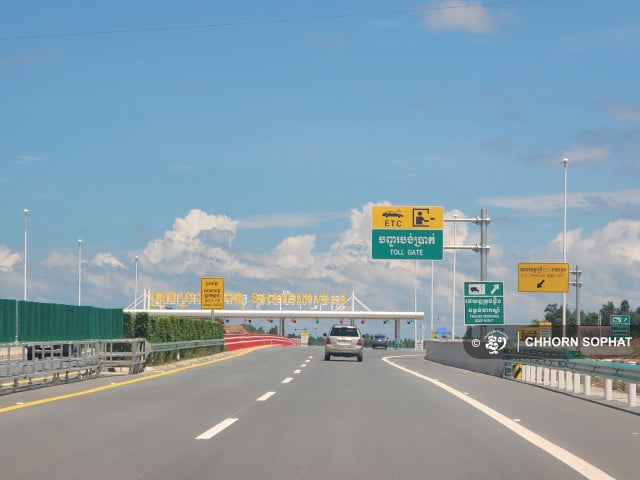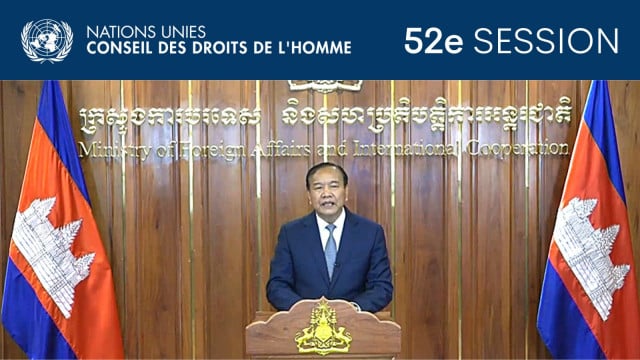On Studying Media Management in Cambodia

- Him Imrorn
- August 27, 2020 5:21 AM
Head of the Department of Media and Communication at the Royal University of Phnom Penh, Ung Bun Y explains the challenges to media management in Cambodia posed by technological advances, changes to the national media landscape and the opportunities available to its graduates.
Him Imrorn: While the Department of Media and Communication is well-known among journalists, can you tell us a little bit about what you do there?
Ung Bun Y: Actually, the Department of Media and Communication (DMC) at RUPP was established in 2001 as the first academic training center for communication, journalism, and media in Cambodia. The four-year Bachelor of Arts in Media Management is designed to train students for various professions within the media sector. With continuing support from our partners, the DMC has been taking lead as the only public academic training ground offering a long-term training toward a bachelor’s degree in the field of media and communication in Cambodia.
Him Imrorn: So what can students expect from this course in terms of the curriculum?
Ung Bun Y: First, I am pleased to inform you that the DMC is part of the Faculty of Social Sciences and Humanities at the Royal University of Phnom Penh. Substantially conducted in English, the curriculum is designed to equip students with multimedia skills. Excluding foundation studies and languages (English and Khmer), students will be able to master skills like news writing and reporting, in-depth/investigative reporting, radio and video production, photojournalism, multimedia and online journalism, media ethics, public relations, graphic design and layout, digital communication, mass communication research, entrepreneurial journalism. Moreover, they will acquire management aspects including newsroom management and project/production management.
Him Imrorn: How do students tend to respond to such comprehensive range of media-related skills?
Ung Bun Y: The purpose of shaping a broad scope of media is to equip students with multimedia skills ranging from journalism to communication, public relations, or media production. We accept that some may not handle all of them, so they can prioritize areas of their interest, but some might be able to acquire all. However, in their senior year, students can choose their graduation options which include final exams, research thesis, and creative media projects. For those who have an interest in research, they will have to conduct written research on media or communication-related topics. For those who are fond of creative media projects, they may choose to produce the short film, documentary film, TV magazine, radio program or drama, photobook, multimedia news website, print or online magazine or newspaper, TV/Radio public service announcement, online or offline multimedia package, and PRs package or campaign.
Him Imrorn: What do applicants need to have if they want to be a media management student at the DMC?
Ung Bun Y: Of course, the DMC offers both scholarship and fee-paying programs. Applicants are required to have good English proficiency, profound insight into Khmer culture, excellent general knowledge, and a strong interest in media. To successfully become DMC students, they are to go through two entrance examinations—written and oral. First, they take a written test on the English language, media issues (in English), and general knowledge and Khmer culture (in Khmer). Those successful are then interviewed in English by the DMC’s faculty members.

Him Imrorn: This sounds like a challenging criteria, what do students typically go on to do upon graduation?
Ung Bun Y: Well, the DMC prides itself on the extremely high employment rate of our graduates, many of whom are now accomplished program producers, communication specialists, news reporters, researchers, academics, and other media-related practitioners. Additionally, prospective career choices for our students include media editor, radio and TV producer, radio and TV presenter, filmmaker, scriptwriter, press/communication officer, advertising and public relations practitioner, journalist/reporter, production manager, photographer, cameraman, and other media-related jobs.
Him Imrorn: Since you are also one of the former students who graduated from the DMC, could you share with us your experiences and how to make the most of this major?
Ung Bun Y: Studying at the DMC is a bit challenging, but it will pay off sooner or later, so to speak. As the program is well-balanced between theories and practices, you do not only learn from the books or documents but also experience what you have learnt with the hands-on practice.
As an alumnus of DMC, I think studying hard is not enough. You need to study in a smart way. Find your areas of interests among the courses offered and prioritize them. As you will be exposed to many class assignments and projects, time management is very important. Don’t depend totally on the lectures, but do more self-study and research. I think it’s also essential to keep yourself well-informed of what’s happening locally, regionally, and globally. To get yourself connected to the industry and prospective job market, attend the department’s arranged guest lecture sessions and internships.















